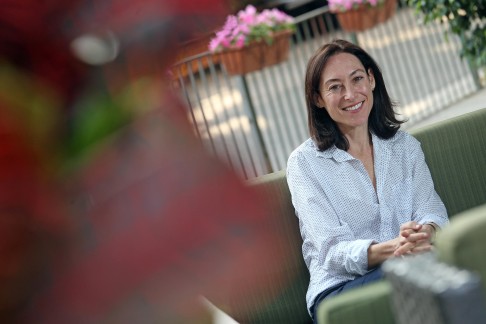
Growing up too soon: why children need to slow down
Children are not only entering puberty earlier than they did a generation ago, their lives are much more complicated because of technology. But they lack the maturity to cope
Growing up isn't what it used to be. Children are entering puberty at increasingly young ages and although their bodies may look like they are growing up fast, they still think like kids.
Dr Cara Natterson, a Los Angeles-based paediatrician and author of several books on child health and wellness, is especially interested in how to manage this disconnect between a child's body and their brain development - and as a mother of an 11-year-old daughter and nine-year-old son, she's seeing it first-hand.
"Children are entering puberty about a year or two sooner than the generation that preceded them - an average age of eight or nine for girls and nine or 10 for boys," says Dr Natterson, who was in Hong Kong last month as part of a visiting speakers series at Hong Kong International School.
There have been plenty of studies into the cause of this and the leading theory puts it down to the chemicals in our environment - our food supply, the lotions we put on our skin. These chemicals are believed to act as hormone disrupters and trick the body into entering puberty sooner.
The big puberty landmarks haven't changed, girls are still beginning menstruation at about age 12 to 13, but there are other, sometimes subtle, biological signs. In girls there may be signs of moodiness, they are more prone to sweating and may have body odour and a little acne as pores clog. It is now normal for girls aged nine to have early breast development. Boys are entering puberty earlier, too, with early signs before the obvious indicators such as facial hair and the voice dropping.
Add to this the knowledge that the brain doesn't mature until the late 20s or early 30s - when the pre-frontal cortex is insulated with a layer of myelin, a substance that insulates nerve fibres so that the signals that help young adults weigh consequences rather than acting on impulse can be transmitted more efficiently - and it's easy to see why growing up can be challenging. And that's before you throw technology, stress and sleep deprivation into the mix.
"The most global advice I give parents is: 'Your child looks older than they can think'. If they look older we think it means they are ready for more freedom - they aren't," says Dr Natterson, who gave two talks at HKIS for parents of primary and secondary students.

She advises parents to teach their children that they are not the victim of hormones, but that they do have an effect. By explaining to children that they may sometimes behave in a strange way - have a fit of giggles or cry - and that it's normal and to just take time out from the situation, it empowers them.
Where life gets more complicated for kids today is the added complication of social media. Dr Natterson draws a firm line on this - no social media for children under the age of 13. And the reason is simply that younger children aren't mature enough to handle it.
"If the pre-frontal cortex isn't developed, children are more likely to make emotional decisions; it's a less mature brain," she says.
While it's not easy playing "bad cop" and telling children they can't do what many of their peers are doing, Dr Natterson says there's an easy way out by pointing to the age requirement stated by social media sites. Facebook and Instagram require users to be at least 13 and Whatsapp won't let anyone in under 16 - although it's easy to flout these requirements.
The biggest gift parents can give their children is to let them grow up slowly
For those parents who have allowed their children to join social media sites but are now having second thoughts, she says it is fine to explain to children that they made a mistake and want to take them off social media networks until they feel they are ready.
Because parents of tweens today didn't grow up with social media themselves, they are often ill-equipped to deal with the associated issues. Dr Natterson predicts in less than 10 years the pendulum will have swung the other way and children won't be exposed to social media - and 24/7 availability - from such a young age.
"The biggest gift parents can give their children is to let them grow up slowly," says Dr Natterson.
She isn't completely anti-technology for children, but feels there is a time and a place for it. For example, introducing young children to technology in the classroom is good if not essential.
"The way children are learning today is totally different - they are learning how to access information rather than memorise. They need to be technologically aware."
But she recommends keeping young children away from screens at home, ensuring their free time is spent making up games and rules and figuring things out for themselves, all of which have established benefits. It delays the 24-hour cycle of texts - a constant chatter and access to peers - that their brains aren't mature enough to handle.
Technology also contributes to sleep deprivation as the backlit screens of tablets and smartphones interrupt sleep patterns. Most children (and adults) fall far short of the recently published recommendations for minimum hours of sleep - and that has a negative impact on learning in the classroom. During sleep the brain reorganises information gathered during the day, making it easier to retrieve the following day. If children don't get a good night's sleep it can affect their ability to learn the next day.
"Phones and tablets should be switched off an hour before bed. I've spoken to kids who say they can turn off their phone and go straight to sleep, but the reality is their quality of sleep is affected. Get the phones out of the bedroom, the temptation is too great," she says.

